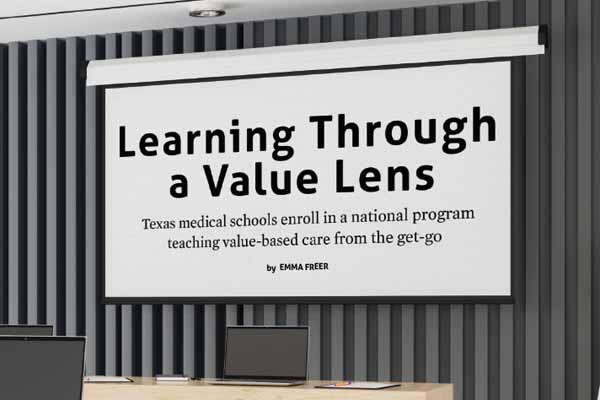
“While medical students spend years studying human anatomy, they are never taught the anatomy of a medical bill.”
At the same time, “confusion around medical bills is increasingly decreasing the value of care.”
So states an “Anatomy of a Bill” website launched by The University of Texas at Austin Dell Medical School fourth-year student Rebekah Scott and a classmate as part of a value-based care educational initiative for medical students – the national Students and Trainees Advocating for Resource Stewardship (STARS) program.
Together, the students developed an interactive online case study following a 25-year-old patient who underwent surgery for deep vein thrombosis, racking up a two-page medical bill with 297 charges totaling $18,650.29.
“Medical billing impacts patients’ experience of their health so much, and we thought that that deserved its own focus,” Ms. Scott told Texas Medicine.
Using the Anatomy of a Bill project as a jumping-off point, Sayali Shelke, a second-year student at Texas A&M University School of Medicine and her STARS classmates hosted a workshop last spring where they hid certain line items and asked the attending students to guess their cost. A lively discussion ensued.
Ms. Scott arrived at Dell Medical School interested in creating value – defined as better outcomes at lower costs – for patients.
She attributes this, in part, to the five years she spent working as a patient advocate between college and medical school, during which she witnessed the shortcomings of the traditional fee-for-service health care system.
“To become sustainable in the long term, our health care system has to shift its focus to more preventive and primary care,” she said. “Value is very important in this discussion.”
Given this experience, she was a natural candidate for STARS. Launched in 2017 by the nonprofit Costs of Care, STARS advances value-based care tenets at medical schools across the U.S., including Dell Medical School and three others in Texas. (See “Counting STARS,” page 31.)
The program seeks to catalyze physicians’ uptake of value-based care, starting with medical students, whom it anticipates will have long, impactful careers. It relies on student-led initiatives as well as virtual summits and other events to spread concepts across cohorts and medical schools.
Since launching the Anatomy of a Bill website, Ms. Scott and her partner have mentored other STARS cohorts as they develop similar medical bill case studies, focusing on diabetes care.
“It really opens up conversations in so many different directions, and that’s what we need,” she said.

The initiative, which originated in Canada and has since been replicated in other countries, exists in the U.S. against the backdrop of increasing awareness of value-based payment models, which incentivize quality over quantity.
For instance, the Centers for Medicare & Medicaid Services aims to transition all Medicare patients to value-based care arrangements by 2030 – a shift Texas Medicaid and commercial payers also are making. Aiming to be on the crest of this wave, the Texas Medical Association recently formed a Task Force on Alternative Payment Models to help physician practices navigate this transition.
Still, many physicians remain wary of or indifferent to value-based care. The vast majority rely on fee-for-service payment, salary, or some combination thereof, while just over a third draw at least some compensation from value-based care, according to the 2020 Deloitte Survey of U.S. Physicians.
Costs of Care envisions the STARS program as a stone thrown into a lake, rippling throughout the careers of participating students.
Fortunately for the program, many students matriculate to medical school an with interest in value-based care. Program leadership attributes the trend in part to generational factors, saying millennials and “Gen Zers” (ranging in ages from 11 to 42) have been raised with an awareness of sustainability, conservation, and good stewardship of resources.
But there are other factors at play. An increasing number of medical students have had their own negative experiences with the costly fee-for-service health care system, either firsthand or with a family member.
Once enrolled, STARS participants develop their own initiatives, which program leadership says gives them a chance to “manage up.” Dell Medical School students, for example, granted faculty members and residents a “STARS Physician Excellence Award” when they espoused value-based care tenets.
This grassroots model appealed to Robert Milman, MD. The retired radiologist in Austin is the STARS faculty champion at Texas A&M, where he helps lead the department of medical education.
“I’ve really enjoyed watching the students engage in the material and understand the complexity of the issue,” he said. “[They] all recognize that they have the potential in the future to be part of the solution, to bring added value to the system and not just be bystanders to that.”
Dr. Milman also emphasizes that the STARS program serves an important extracurricular function, bolstering students’ education in health care economics and supplementing what they learn in the classroom.
Ms. Shelke says medical school curricula typically don’t include value-based care as an area of study. She adds physicians often are limited in what they can do for patients who can’t access preventive care or afford curative care, so she has relied on the STARS program to learn more.
It’s too early to tell the full impact of the STARS program, now in its sixth year. But Dr. Milman believes training medical students to be upstanders will pay off in the long term.
“To be successful in influencing change, our next generation of physicians needs the knowledge, clinical experiences, and tools to lead up,” he said.
Back at Dell Medical, Ms. Scott is eager to apply her knowledge in practice and as a physician-advocate for better systems of preventive and primary care.
“STARS has empowered me as a student to think about that during medical school and heading into residency – and beyond.”
Emma Freer
Associate Editor
(512) 370-1383